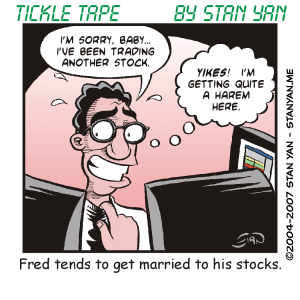Are you tired of facing setback after setback? Traders must be thick-skinned to keep trading over the long haul. It’s common to get knocked down hard and have to quickly pick yourself up and tackle the next challenge. So how can you continue to persist after getting knocked down again and again? One of the best ways to persist in the face of defeat is to psychologically minimize the impact of a setback.
Setbacks can take a psychological toll. With each setback, you lose a little energy. It can all add up until you get to the point where you feel you can’t take even another minor setback. At some point, past setbacks can produce future setbacks. Trading requires skill. When you’ve been worn out by experiencing repeated setbacks, it’s hard to trade skillfully. By minimizing the impact of a setback, however, you can cope with repeated setbacks and recover quickly.
A setback can be psychologically damaging if you elevate its importance. If you work under the assumption that “a winning trader is thoroughly competent,” you’ll be disappointed when you make even the slightest trading mistake. Actually, even a seasoned trader makes trading errors, so the idea that you must be thoroughly competent is unrealistic. That said, it’s often hard to avoid feeling beaten when you’ve taken a few big hits to your account balance. There’s a lot you can do both physically and psychologically to minimize the impact of repeated setbacks, however.
From a purely physical standpoint, it is essential to minimize the potential impact that a losing trade may have on your account balance. If you lose big on a single trade, it will sting. But if you limit the amount of capital you risk on a single trade, it won’t hurt at all. You can pick yourself up easily and put on the next trade. It’s much easier to take a loss in stride when the real impact on your account balance is minimal.
From a psychological standpoint, there are thinking strategies you can use to minimize the impact of a setback. First, minimize its symbolic importance. Many people over-interpret setbacks by imbuing them with more emotions than are warranted. They view setbacks as a form of punishment as if a teacher or parent is punishing them for doing something wrong. But trading mistakes are typically less important than breaking a moral imperative. It may feel natural to react as if you have been punished for a trading error, but it is vital to remember that you are merely punishing yourself unnecessarily.
Why beat yourself up when you can take the setback in stride and move on to the next winning trade? Second, don’t confuse trading outcomes with personal significance. If you lose big, for example, the loss may have great financial significance but it doesn’t need to have great personal significance. You can wipe out your entire account, but that doesn’t mean you are diminished in the eyes of friends and family. You don’t need to let a loss or setback make you feel less worthy as a person. Now, professional investors might say, “If the loss is too big, I’ll get fired.” All right, you’ll get fired. That’s a big consequence for your mistake, but don’t confuse a bad, unpleasant consequence with feelings of self-esteem and worth. The impact you put on a setback is arbitrary in the end. It only matters because you make it matter.
If you decide that it really doesn’t matter, then it will not matter. If you decided that you didn’t care about losing your job, then trading losses wouldn’t matter to you. It’s all in how you look at it. And if it is all in how you look at it, then why not always look at a loss or a setback in a positive light? Why not think, “I’m making too big of a deal over nothing.” Ironically, when you psychologically minimize the impact of a setback and treat it as if it isn’t important, you’ll trade better. You will feel relieved. And when the pressure is off, you can more easily think of creative ways of trading the markets with aplomb.
Profitable trading requires you to trade with a peak performance mindset, but this mindset is difficult to cultivate when riddled with doubt and frustration. It’s vital that you calm down and think freely. Minimizing the psychological significance of a setback can help you stay calm, free, and objective. And when you feel this way, you’ll trade profitably.


